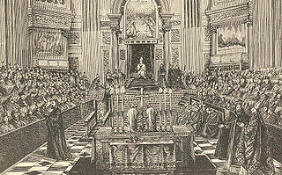
A Hstory Of The Councils Of The Church Volumes 1 to 5 by Charles Joseph Hefele D.D.
EDITOR’S PREFACE
THE Author’s Preface to this portion of his work has already appeared in the second volume of the English Translation. He there remarks that this History “becomes in many ways very like a history of the Church and of dogmas, which will be no prejudice to it.” This is, of course, the exact truth of the matter, and it is the chief interest of the work. The History of the Councils differs from that of Doctrines in dealing only with those questions which come formally before the Church in her Synods. Both are of inestimable value, and of absolute necessity, to all who aspire to the name of theologian.
In the present volume this view of the subject is made more prominent than in any other; as the whole of its contents, with some slight exceptions, refer to the controversy respecting the Person of our Lord and Saviour Jesus Christ, in the two great conflicts of the Church with Nestorianism and Eutychianism. It begins with an account of the rise of the former, and ends with the condemnation of the latter at the great Synod of Chalcedon.
Consequently, this volume possesses an interest which attaches to hardly any other, and is marked by an unity which is seldom attainable in historical narrative. The Author has felt throughout that the subject was vital to the Church of Christ then and now, and he has spared no pains to bring the resources of his vast learning to bear upon the elucidation of his theme. As a result, we know nearly everything that can be known respecting the heresies of Nestorius and Eutyches, and the reason of their rejection by the Catholic Church.
Considerable light is thrown by this volume upon two subjects which have been much debated of late—the Athanasian Creed and the relation of the Pope of Rome to the Christian Church. It will be quite clear to the reader that the Quicunque Vult could not have been written by S. Athanasius; but it will be equally clear that it does little more than embody the phrases respecting the Person of Christ which were sanctioned in the Creed that was drawn up at Chalcedon. To theological students who really grapple with the essential elements of the question, it will also be plain that the theological or Christological phrases in the “Athanasian Creed” to which the greatest exception has been taken, are simple and necessary contradictions of Nestorianism and Eutychianism, either of which heresies would have undermined the Nicene faith.
With regard to the Papacy, it is inevitable that a non-Roman Editor should take exception to some of Bishop Hefele’s remarks in the 28th canon of Chalcedon. We, of course, believe that the Council in that canon stated the exact truth respecting the position assigned to the Bishop of Rome. This, however, is a matter of opinion, and we only caution the reader that he may form a judgment for himself.
Of the other points on which differences of opinion will exist, we need refer only to the character of Cyril of Alexandria, who presided at the Council of Ephesus. Many will think that Bishop Hefele has dealt partially with this great and powerful man. It will probably seem to most that he behaved with unnecessary haste in opening the Synod before the arrival of the Antiochenes. On the other hand, there seems no reason to doubt that his antagonists purposely delayed their arrival, and gave him to understand that the proceedings might begin. At any rate, the Author appears to have stated the case with all possible accuracy.
It is inevitable that errata should occur in this volume. The Editor has already discovered the word “Dyophysite” spelt “Diophysite” in two places. Great care has been taken to secure accuracy, and it is hoped that no serious error may remain. The Editor has been indebted to several friends, and especially to one accomplished friend whose assistance has been invaluable. He will welcome any suggestions which may be offered for the improvement of his work; and he is bound, in conclusion, to acknowledge the great pains taken by the experienced publishers and printers in order that every possibility of error might be guarded against.
Copyright ©1999-2023 Wildfire Fellowship, Inc all rights reserved

 Keep Site Running
Keep Site Running